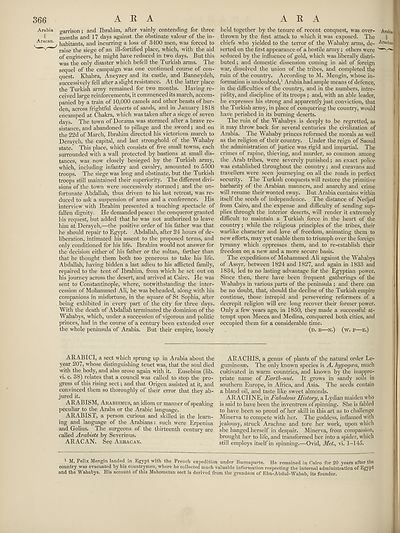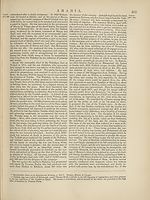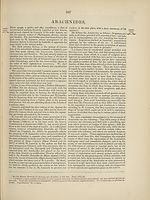Encyclopaedia Britannica > Volume 3, Anatomy-Astronomy
(374) Page 366
Download files
Complete book:
Individual page:
Thumbnail gallery: Grid view | List view

366 A R A
Arabia garrison; and Ibrahim, after vainly contending for three
II months and 17 days against the obstinate valour of the in-
Aratan. an(j incurring a loss of 3400 men, was forced to
raise the siege of an ill-fortified place, which, with the aid
of engineers, he might have reduced in two days. But this
was the only disaster which befell the Turkish arms. The
sequel of the campaign was one continued course of con¬
quest. Khabra, Aneyzey and its castle, and Banneydeh,
successively fell after a slight resistance. At the latter place
the Turkish army remained for two months. Having re¬
ceived large reinforcements, it commenced its march, accom¬
panied by a train of 10,000 camels and other beasts of bur¬
den, across frightful deserts of sands, and in January 1818
encamped at Chakra, which was taken after a siege of seven
davs. The town of Dorama was stormed after a brave re¬
sistance, and abandoned to pillage and the sword; and on
the 22d of March, Ibrahim directed his victorious march to
Derayeh, the capital, and last stronghold of the Wahaby
state. This place, which consists of five small towns, each
surrounded with a wall protected by bastions at small dis¬
tances, was now closely besieged by the Turkish army,
which, including infantry and cavalry, amounted to 5500
troops. The siege was long and obstinate, but the Turkish
troops still maintained their superiority. The different divi¬
sions of the town were successively stormed; and the un¬
fortunate Abdallah, thus driven to his last retreat, was re¬
duced to ask a suspension of arms and a conference. His
interview with Ibrahim presented a touching spectacle of
fallen dignity. He demanded peace: the conqueror granted
his request, but added that he was not authorized to leave
him at Derayeh,—the positive order of his father was that
he should repair to Egypt. Abdallah, after 24 hours of de¬
liberation, intimated his assent to the proposed terms, and
only conditioned for his life. Ibrahim would not answer for
the decision either of his father or the sultan, farther than
that he thought them both too generous to take his life.
Abdallah, having bidden a last adieu to his afflicted family,
repaired to the tent of Ibrahim, from which he set out on
his journey across the desert, and arrived at Cairo. He was
sent to Constantinople, where, notwithstanding the inter¬
cession of Mohammed Ali, he was beheaded, along with his
companions in misfortune, in the square of St Sophia, after
being exhibited in every part of the city for three days.
With the death of Abdallah terminated the dominion of the
Wahabys, which, under a succession of vigorous and politic
princes, had in the course of a century been extended over
the whole peninsula of Arabia. But their empire, loosely
A R A
held together by the tenure of recent conquest, was over- Arabia
thrown by the first attack to which it was exposed. The ||
chiefs who yielded to the terror of the Wahaby arms, de- ■^racl>ne
serted on the first appearance of a hostile army ; others were ''■"V'*’
seduced by the influence of gold, which was liberally distri¬
buted ; and domestic dissension coming in aid of foreign
war, dissolved the union of the tribes, and completed the
ruin of the country. According to M. Mengin, whose in¬
formation is undoubted,1 Arabia had ample means of defence,
in the difficulties of the country, and in the numbers, intre¬
pidity, and discipline of its troops ; and, with an able leader,
he expresses his strong and apparently just conviction, that
the Turkish army, in place of conquering the country, would
have perished in its burning deserts.
The ruin of the Wahabys is deeply to be regretted, as
it may throw back for several centuries the civilization of
Arabia. The Wahaby princes reformed the morals as well
as the religion of their country. Under the reign of Saoud
the administration of justice was rigid and impartial. The
crimes of rapine, thieving, and murder, so common among
the Arab tribes, were severely punished; an exact police
was established throughout the country ; and caravans and
travellers were seen journeying on all the roads in perfect
security. The Turkish conquests will restore the primitive
barbarity of the Arabian manners, and anarchy and crime
will resume their wonted sway. But Arabia contains within
itself the seeds of independence. The distance of Nedjed
from Cairo, and the expense and difficulty of sending sup¬
plies through the interior deserts, will render it extremely
difficult to maintain a Turkish force in the heart of the
country; while the religious principles of the tribes, their
warlike character and love of freedom, animating them to
new efforts, may yet enable them to triumph over the foreign
tyranny which oppresses them, and to re-establish their
freedom on a new and a more secure basis.
The expeditions of Mohammed Ali against the Wahabys
of Assyr, between 1824 and 1827, and again in 1833 and
1834, led to no lasting advantage for the Egyptian power.
Since then, there have been frequent gatherings of the
Wahabys in various parts of the peninsula ; and there can
be no doubt, that, should the decline of the Turkish empire
continue, those intrepid and persevering reformers of a
decrepit religion will ere long recover their former power.
Only a few years ago, in 1850, they made a successful at¬
tempt upon Mecca and Medina, conquered both cities, and
occupied them for a considerable time.
(d. b—n.) (w. p—E.)
ARABICI, a sect which sprung up in Arabia about the
year 207, whose distinguishing tenet was, that the soul died
with the body, and also arose again with it. Eusebius (lib.
vi. c. 38) relates that a council was called to stop the pro¬
gress of this rising sect; and that Origen assisted at it, and
convinced them so thoroughly of their error that they ab¬
jured it.
ARABISM, Arabismus, an idiom or manner of speaking
peculiar to the Arabs or the Arabic language.
ARABIST, a person curious and skilled in the learn¬
ing and language of the Arabians: such were Erpenius
and Golius. The surgeons of the thirteenth century are
called Arabists by Severinus.
ARACAN. See Akracan.
ARACHIS, a genus of plants of the natural order Le-
guminosm. The only known species is A. hypogaa, much
cultivated in warm countries, and known by the inappro¬
priate name of Earth-nut. It grows in sandy soils in
southern Europe, in Africa, and Asia. The seeds contain
a bland oil, and taste like sweet almonds.
ARACHNE, in Fabulous History, a Lydian maiden who
is said to have been the inventress of spinning. She is fabled
to have been so proud of her skill in this art as to challenge
Minerva to compete with her. The goddess, inflamed with
jealousy, struck Arachne and tore her work, upon which
she hanged herself in despair. Minerva, from compassion,
brought her to life, and transformed her into a spider, which
still employs itself in spinning.—Ovid, Met., vi. 1-145.
1 M. Felix Mengin landed in Egypt with the French expedition under Buonaparte. lie remained in Cairo for 20 years after the
country was evacuated by his countrymen, where he collected much valuable information respecting the internal administration of Egypt
and the Wahabys. His account of this Mahometan sect is derived from the grandson of Ebn-Abdul-Wahab, its founder.
Arabia garrison; and Ibrahim, after vainly contending for three
II months and 17 days against the obstinate valour of the in-
Aratan. an(j incurring a loss of 3400 men, was forced to
raise the siege of an ill-fortified place, which, with the aid
of engineers, he might have reduced in two days. But this
was the only disaster which befell the Turkish arms. The
sequel of the campaign was one continued course of con¬
quest. Khabra, Aneyzey and its castle, and Banneydeh,
successively fell after a slight resistance. At the latter place
the Turkish army remained for two months. Having re¬
ceived large reinforcements, it commenced its march, accom¬
panied by a train of 10,000 camels and other beasts of bur¬
den, across frightful deserts of sands, and in January 1818
encamped at Chakra, which was taken after a siege of seven
davs. The town of Dorama was stormed after a brave re¬
sistance, and abandoned to pillage and the sword; and on
the 22d of March, Ibrahim directed his victorious march to
Derayeh, the capital, and last stronghold of the Wahaby
state. This place, which consists of five small towns, each
surrounded with a wall protected by bastions at small dis¬
tances, was now closely besieged by the Turkish army,
which, including infantry and cavalry, amounted to 5500
troops. The siege was long and obstinate, but the Turkish
troops still maintained their superiority. The different divi¬
sions of the town were successively stormed; and the un¬
fortunate Abdallah, thus driven to his last retreat, was re¬
duced to ask a suspension of arms and a conference. His
interview with Ibrahim presented a touching spectacle of
fallen dignity. He demanded peace: the conqueror granted
his request, but added that he was not authorized to leave
him at Derayeh,—the positive order of his father was that
he should repair to Egypt. Abdallah, after 24 hours of de¬
liberation, intimated his assent to the proposed terms, and
only conditioned for his life. Ibrahim would not answer for
the decision either of his father or the sultan, farther than
that he thought them both too generous to take his life.
Abdallah, having bidden a last adieu to his afflicted family,
repaired to the tent of Ibrahim, from which he set out on
his journey across the desert, and arrived at Cairo. He was
sent to Constantinople, where, notwithstanding the inter¬
cession of Mohammed Ali, he was beheaded, along with his
companions in misfortune, in the square of St Sophia, after
being exhibited in every part of the city for three days.
With the death of Abdallah terminated the dominion of the
Wahabys, which, under a succession of vigorous and politic
princes, had in the course of a century been extended over
the whole peninsula of Arabia. But their empire, loosely
A R A
held together by the tenure of recent conquest, was over- Arabia
thrown by the first attack to which it was exposed. The ||
chiefs who yielded to the terror of the Wahaby arms, de- ■^racl>ne
serted on the first appearance of a hostile army ; others were ''■"V'*’
seduced by the influence of gold, which was liberally distri¬
buted ; and domestic dissension coming in aid of foreign
war, dissolved the union of the tribes, and completed the
ruin of the country. According to M. Mengin, whose in¬
formation is undoubted,1 Arabia had ample means of defence,
in the difficulties of the country, and in the numbers, intre¬
pidity, and discipline of its troops ; and, with an able leader,
he expresses his strong and apparently just conviction, that
the Turkish army, in place of conquering the country, would
have perished in its burning deserts.
The ruin of the Wahabys is deeply to be regretted, as
it may throw back for several centuries the civilization of
Arabia. The Wahaby princes reformed the morals as well
as the religion of their country. Under the reign of Saoud
the administration of justice was rigid and impartial. The
crimes of rapine, thieving, and murder, so common among
the Arab tribes, were severely punished; an exact police
was established throughout the country ; and caravans and
travellers were seen journeying on all the roads in perfect
security. The Turkish conquests will restore the primitive
barbarity of the Arabian manners, and anarchy and crime
will resume their wonted sway. But Arabia contains within
itself the seeds of independence. The distance of Nedjed
from Cairo, and the expense and difficulty of sending sup¬
plies through the interior deserts, will render it extremely
difficult to maintain a Turkish force in the heart of the
country; while the religious principles of the tribes, their
warlike character and love of freedom, animating them to
new efforts, may yet enable them to triumph over the foreign
tyranny which oppresses them, and to re-establish their
freedom on a new and a more secure basis.
The expeditions of Mohammed Ali against the Wahabys
of Assyr, between 1824 and 1827, and again in 1833 and
1834, led to no lasting advantage for the Egyptian power.
Since then, there have been frequent gatherings of the
Wahabys in various parts of the peninsula ; and there can
be no doubt, that, should the decline of the Turkish empire
continue, those intrepid and persevering reformers of a
decrepit religion will ere long recover their former power.
Only a few years ago, in 1850, they made a successful at¬
tempt upon Mecca and Medina, conquered both cities, and
occupied them for a considerable time.
(d. b—n.) (w. p—E.)
ARABICI, a sect which sprung up in Arabia about the
year 207, whose distinguishing tenet was, that the soul died
with the body, and also arose again with it. Eusebius (lib.
vi. c. 38) relates that a council was called to stop the pro¬
gress of this rising sect; and that Origen assisted at it, and
convinced them so thoroughly of their error that they ab¬
jured it.
ARABISM, Arabismus, an idiom or manner of speaking
peculiar to the Arabs or the Arabic language.
ARABIST, a person curious and skilled in the learn¬
ing and language of the Arabians: such were Erpenius
and Golius. The surgeons of the thirteenth century are
called Arabists by Severinus.
ARACAN. See Akracan.
ARACHIS, a genus of plants of the natural order Le-
guminosm. The only known species is A. hypogaa, much
cultivated in warm countries, and known by the inappro¬
priate name of Earth-nut. It grows in sandy soils in
southern Europe, in Africa, and Asia. The seeds contain
a bland oil, and taste like sweet almonds.
ARACHNE, in Fabulous History, a Lydian maiden who
is said to have been the inventress of spinning. She is fabled
to have been so proud of her skill in this art as to challenge
Minerva to compete with her. The goddess, inflamed with
jealousy, struck Arachne and tore her work, upon which
she hanged herself in despair. Minerva, from compassion,
brought her to life, and transformed her into a spider, which
still employs itself in spinning.—Ovid, Met., vi. 1-145.
1 M. Felix Mengin landed in Egypt with the French expedition under Buonaparte. lie remained in Cairo for 20 years after the
country was evacuated by his countrymen, where he collected much valuable information respecting the internal administration of Egypt
and the Wahabys. His account of this Mahometan sect is derived from the grandson of Ebn-Abdul-Wahab, its founder.
Set display mode to:
![]() Universal Viewer |
Universal Viewer | ![]() Mirador |
Large image | Transcription
Mirador |
Large image | Transcription
Images and transcriptions on this page, including medium image downloads, may be used under the Creative Commons Attribution 4.0 International Licence unless otherwise stated. ![]()
| Encyclopaedia Britannica > Encyclopaedia Britannica > Volume 3, Anatomy-Astronomy > (374) Page 366 |
|---|
| Permanent URL | https://digital.nls.uk/193762210 |
|---|
| Attribution and copyright: |
|
|---|---|
| Shelfmark | EB.16 |
|---|---|
| Description | Ten editions of 'Encyclopaedia Britannica', issued from 1768-1903, in 231 volumes. Originally issued in 100 weekly parts (3 volumes) between 1768 and 1771 by publishers: Colin Macfarquhar and Andrew Bell (Edinburgh); editor: William Smellie: engraver: Andrew Bell. Expanded editions in the 19th century featured more volumes and contributions from leading experts in their fields. Managed and published in Edinburgh up to the 9th edition (25 volumes, from 1875-1889); the 10th edition (1902-1903) re-issued the 9th edition, with 11 supplementary volumes. |
|---|---|
| Additional NLS resources: |
|

